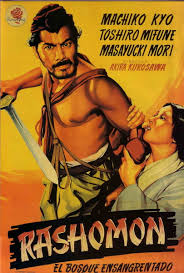When thinking about great film makers, Akira Kurosawa is on top of my list, as one of the greatest Japanese directors of all time. I was first introduced to Kurosawa, a few years ago, when I watched Seven Samurai (1954). At first, I was a little bit skeptical about watching this film because the film was over three hours long and it was subtitled, but after watching this masterpiece, I became a huge fan of Kurosawa. Outside of Seven Samurai, perhaps the best known Kurosawa film to American and European audiences is Rashoman (1950), a murder-rape mystery set during the twelfth century.
Rashoman is based on two Ryunosuke Akutagawa short stories entitled, “Rashomon” and “In a Grove”.Rashomon, in a sense, is a film about illusion vs truth. What do I mean by this? It’s simple, throughout the whole film, the audience is provided with four testimonies that conflict with each other over how the murder-rape took place. The audience does not really know who to trust in the film because all the testimonials are different and contradictory.
First, you have Tajomaru (Toshiro Mifune), a bandit who states that he deceived the murder victim (a samurai played by Masayuki Mori) into following him to look at some swords he hidden in the forest. Taromaru then ties him up and proceeds to rape the samurai’s wife (Machiko Kyo) who eventually gives in and is willing to go with him, provided that Taromaru engages in a one-on-one battle with her husband, in order to hide her shame of being raped. Taromaru and the samurai fight honorably, but in the end Taromaru kills the samurai; the samurai’s wife meanwhile flees from the fighting.
The samurai’s wife’s story, however, is different from Taromaru’s story where she portray’s herself as a helpless victim, (as opposed to Taromaru’ story where she is portrayed as a proud woman willing to defend herself and her husband, but sucombs to Taromaru’s advances in the end), who is brutally raped and after Taromaru departs, she begs her husband to forgive her. The husband, however, looks at her with disdain. His unforgiving look, frightens her and she faints. When the samurai’s wife awakens, she discovers that her husband is dead with her dagger in him. After learning of her husbands death, the samurai’s wife tries to drown herself in a river, but is ultimately unsuccessful.

No comments:
Post a Comment